Zoho CRM: A Robust Solution for Scaling Businesses
Zoho CRM is a well-established solution that serves over 250,000 businesses across 180 countries, designed to convert leads, engage with customers, and foster growth. It offers a comprehensive suite of advanced features, an intuitive user interface, and prioritizes security and privacy. Zoho CRM's flexible contracts, absence of hidden costs, and round-the-clock enterprise support, coupled with the fastest implementation in the market, make it a compelling choice for businesses looking to scale.
HubSpot Sales Hub: Catering to Small Business Needs
HubSpot Sales Hub is recognized as a good starting point for small businesses. It provides a range of basic functions that SMBs require without necessitating the purchase of multiple tools. However, as businesses grow, they often find HubSpot's functionality limited, particularly in terms of customization, process automation, in-depth analytics, and AI features.
Pricing Comparison
When it comes to pricing, Zoho CRM and HubSpot Sales Hub offer different structures:
- Zoho CRM Professional is billed monthly at $35 or annually at $23 per user.
- Sales Hub Starter for two users is $20 monthly or $18 annually.
- Zoho CRM Enterprise is available at $50 per month.
- Sales Hub Professional for five users costs $500 monthly or $450 annually.
- Zoho CRM Ultimate's monthly rate is $65.
- Sales Hub Enterprise for ten users is priced at $1200 annually.
Feature Set: A Detailed Look
Both platforms offer a range of features, but Zoho CRM often provides more depth and customization. For example, Zoho CRM supports multiple currencies, SalesSignals, and a variety of automation and process management tools that HubSpot does not match. Zoho CRM also excels in areas like product customization, page layouts, and validation rules, which are limited or absent in HubSpot.
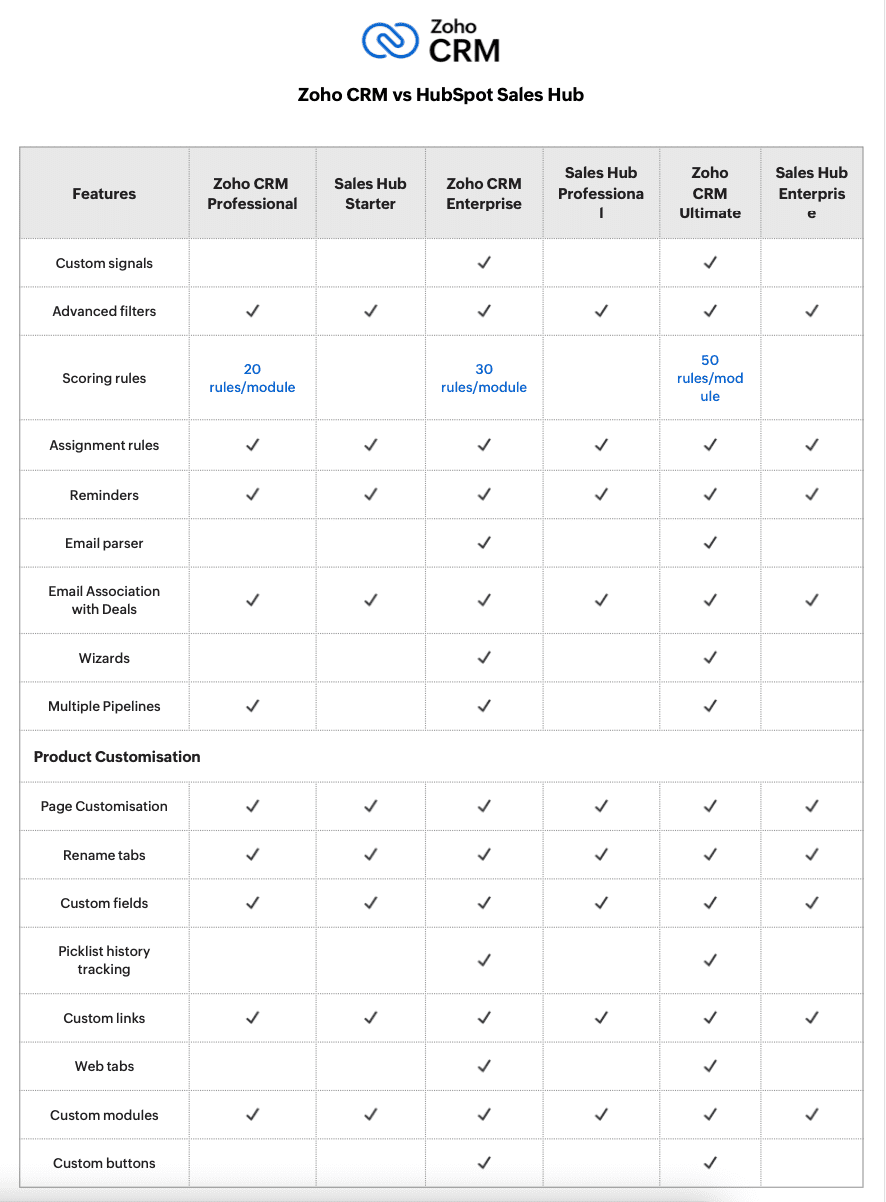
Advanced Capabilities
Zoho's AI assistant, Zia, offers predictive analytics, data enrichment, and intelligent automation suggestions. These advanced AI capabilities are part of Zoho's suite across all tiers, from Professional to Ultimate, and are designed to enhance sales and marketing effectiveness.
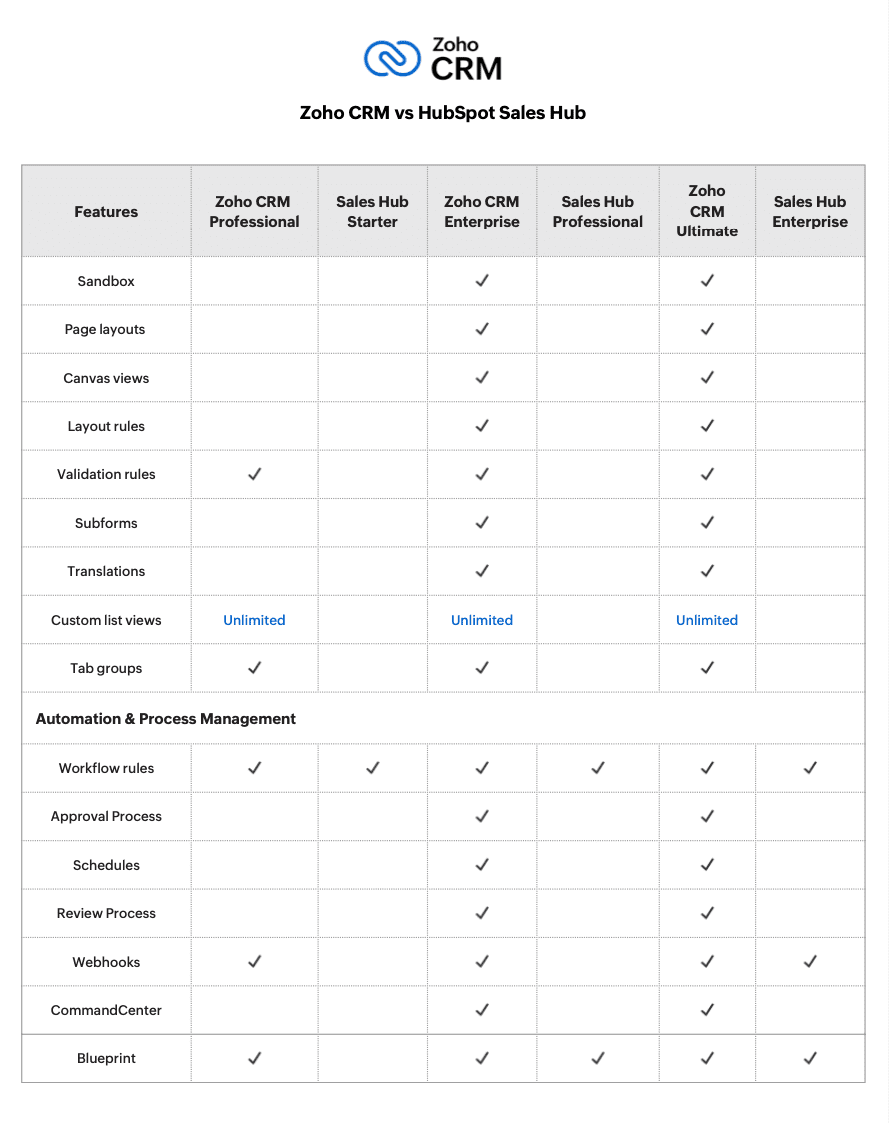
Reporting and Analytics
Both platforms provide reporting and analytics tools, but Zoho CRM tends to offer more advanced features such as anomaly detectors powered by Zia, custom dashboards, and webform analytics, which are not as extensive in HubSpot.
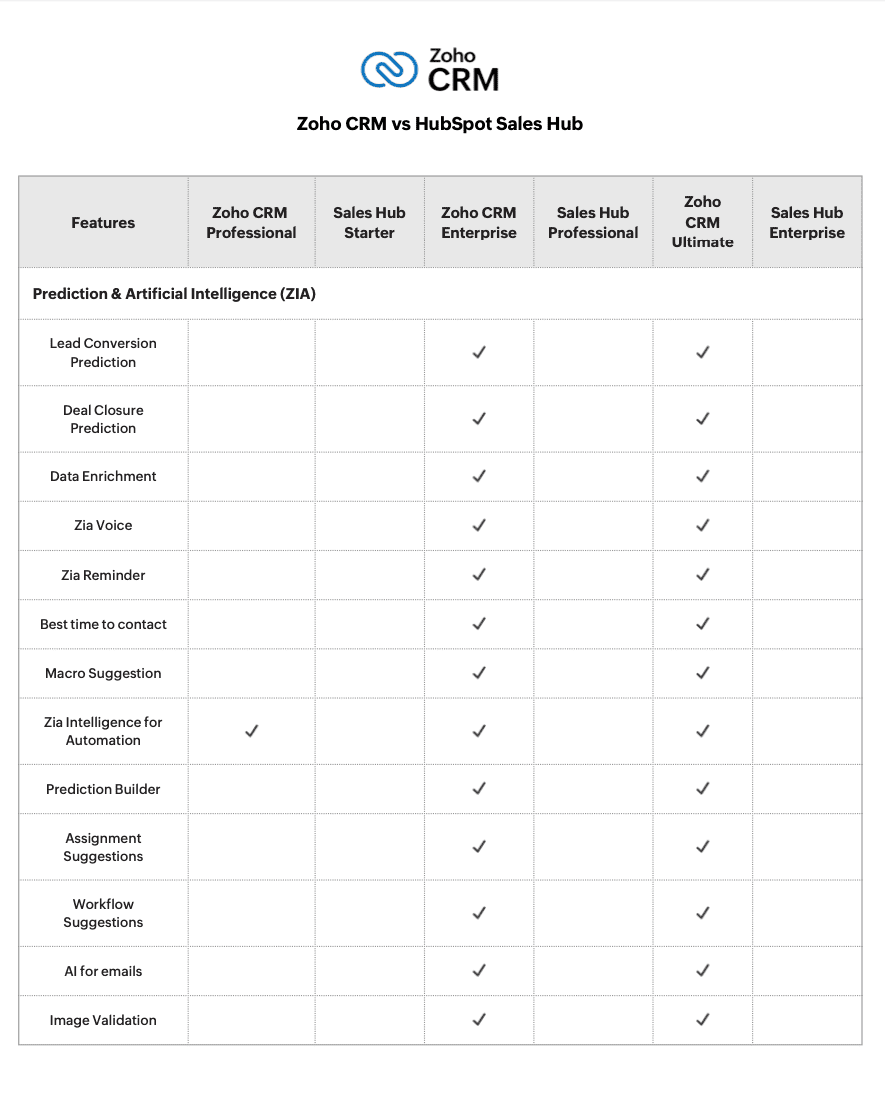
Social Media and Marketing Automation
Zoho CRM integrates social media profiles, offers automated lead generation from social channels, and includes a lite edition of Zoho Social for free with paid plans. It also covers all aspects of marketing automation, from email templates to website visitor tracking, which are essential for modern digital marketing strategies.
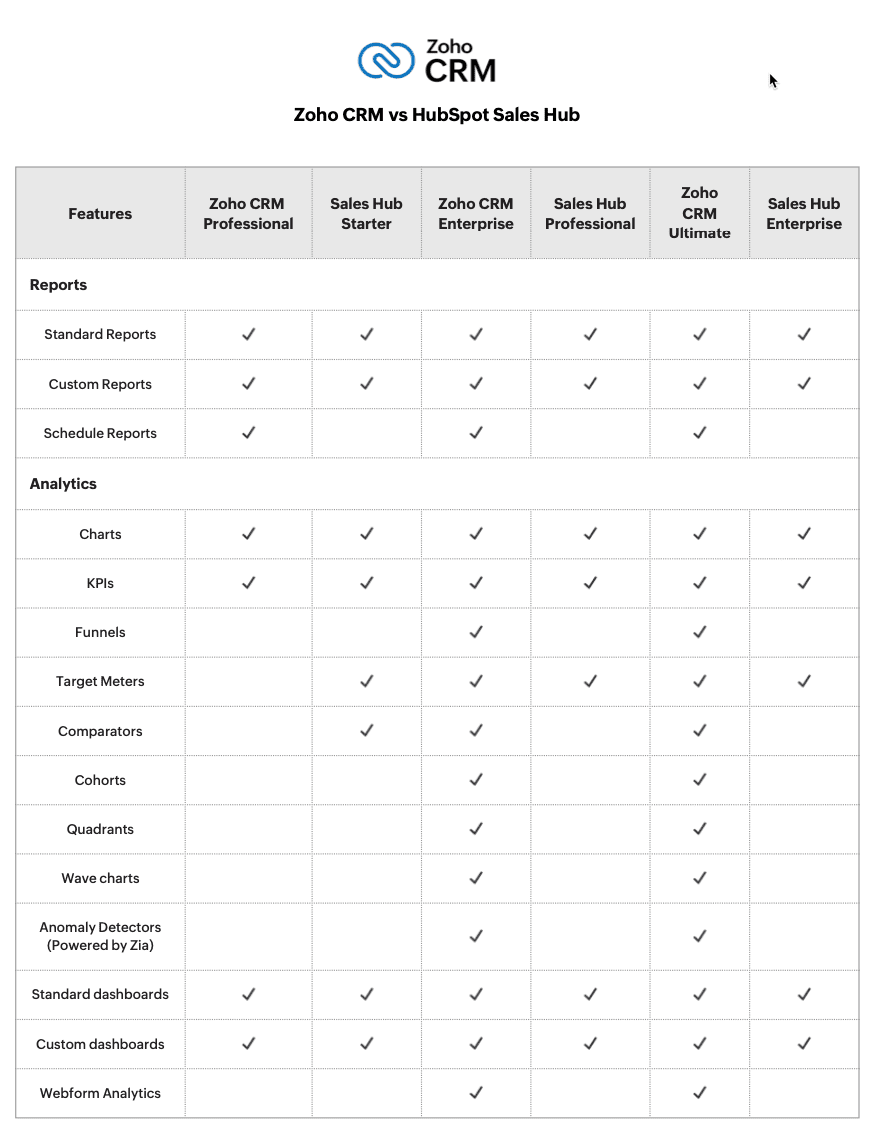
Collaboration and Inventory Management
The platforms also differ in collaboration tools and inventory management. Zoho CRM provides a more extensive set of features that facilitate team collaboration and manage inventory, invoices, and orders more effectively.
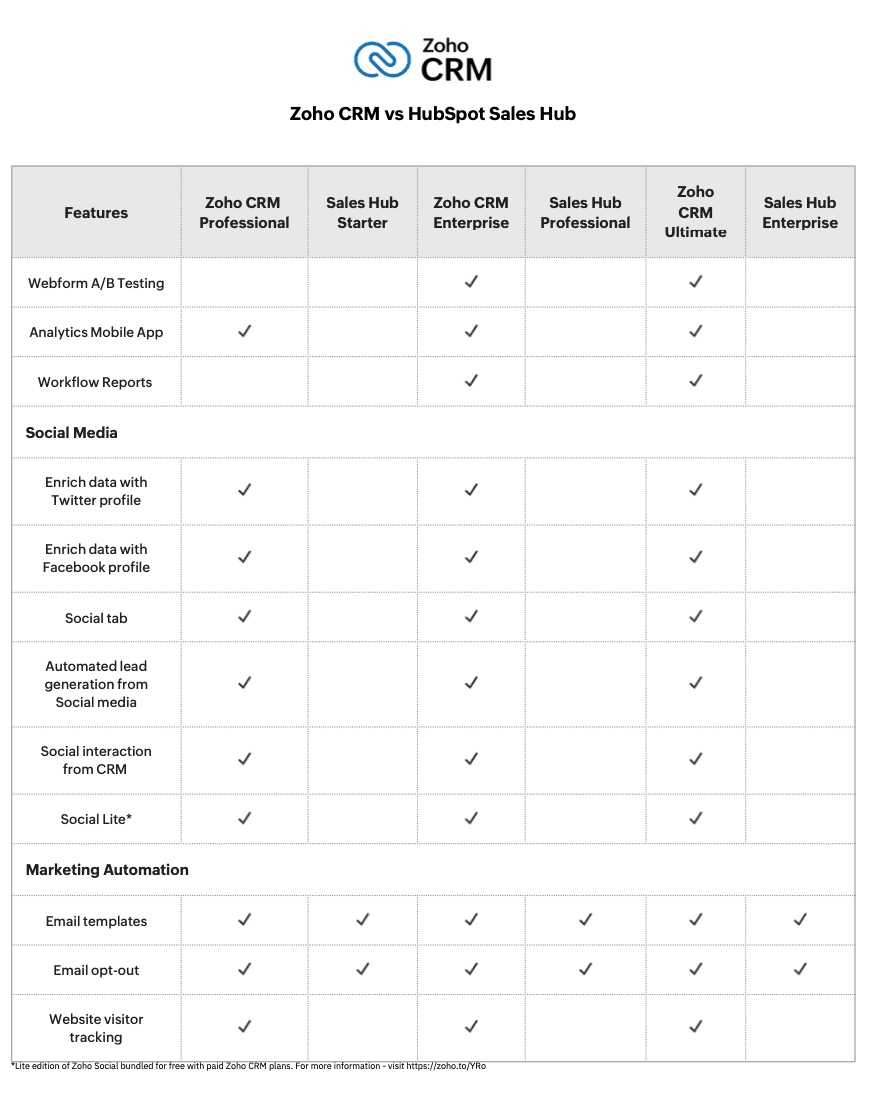
Storage, Data, and Security Administration
Zoho CRM offers more generous storage options and comprehensive data administration and security features, including GDPR compliance, data encryption, and advanced developer tools, which provide added value for businesses concerned with data security and compliance.
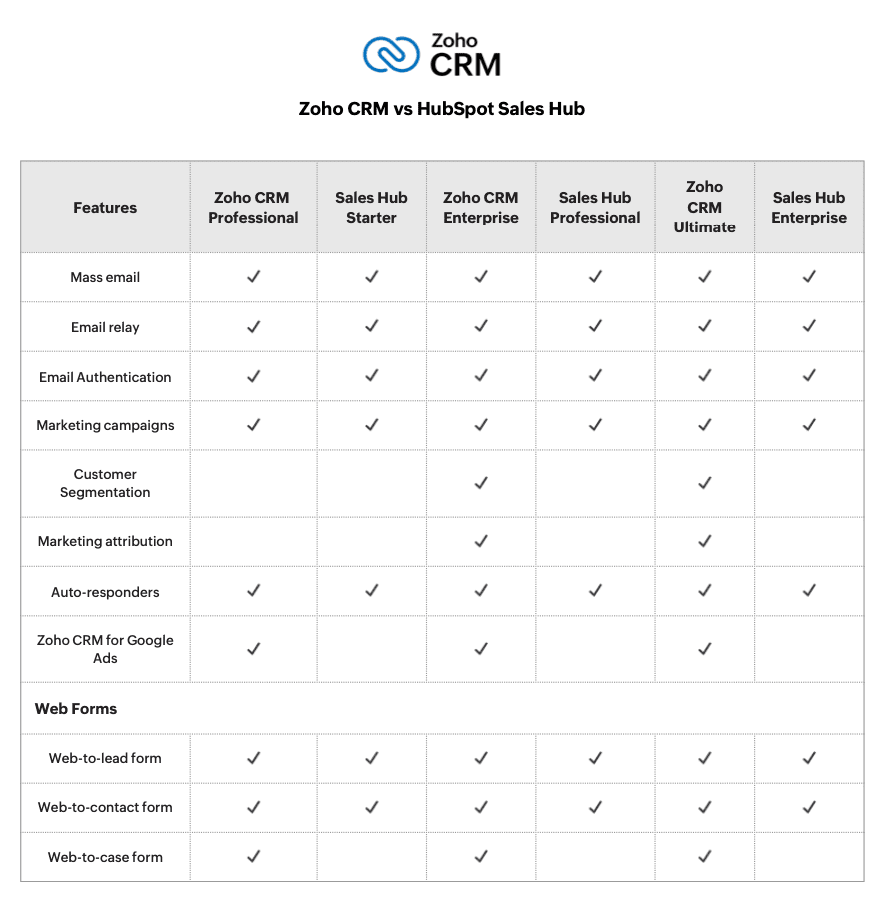
What Unique Capabilities Does Zoho CRM Offer Over HubSpot?
- SalesSignals: Real-time notifications about customer engagement.
- Multiple Currencies: Support for 100 currencies as opposed to HubSpot's 5.
- Customization Options: Extensive custom modules, buttons, links, and web tabs.
- Advanced Automation: Features like Blueprint, CommandCenter, and Workflow Suggestions powered by Zia, Zoho’s AI.
- AI Features: Lead Conversion Prediction, Deal Closure Prediction, and Zia Voice.
- Comprehensive Reporting Tools: Anomaly Detectors, custom dashboards, webform analytics, and more.
- Social Media Integration: Enrich data with social profiles, automated lead generation from social media, and a lite version of Zoho Social included.
- Inventory Management: Products, price books, sales quotes, and order management.
- Customer Support Features: User Portal, Portals, and Case Escalation Rules.
- File Storage: More generous storage limits per organization and user.
- Data and Security Administration: Free data backups, GDPR compliance, audit logs, and territory management.
- Developer Tools: Mobile SDK, Web Apps SDK, Widgets, and API access for customization and integration.
- Integration with Microsoft Products: Plugins for Microsoft Outlook and Microsoft 365.
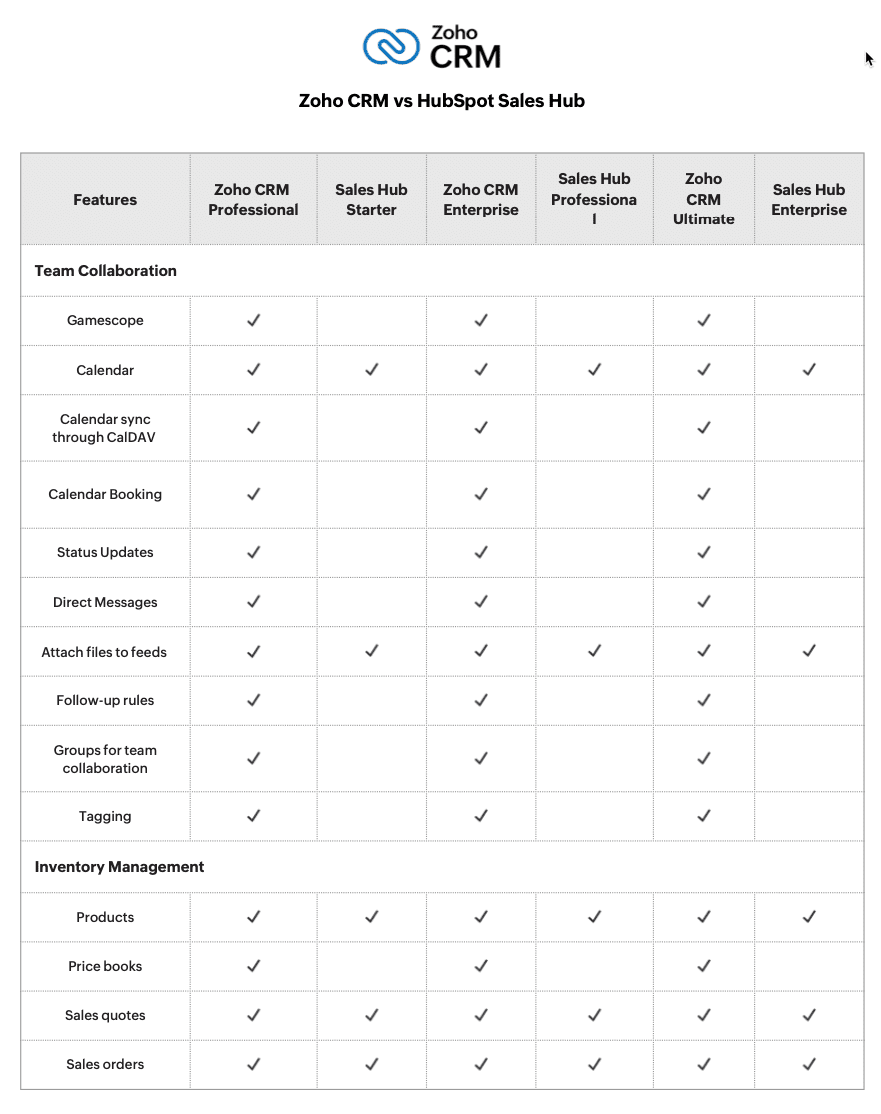
Key Attributes of HubSpot CRM That Might Be Understated in Zoho CRM
- Inbound Marketing Tools: HubSpot is renowned for its suite of inbound marketing tools, which are deeply integrated with its CRM platform.
- Content Creation Tools: HubSpot provides a range of content creation tools, including blogging platforms, which are not a core feature of Zoho CRM.
- Marketing Hub Integration: While Zoho offers marketing tools, HubSpot's Marketing Hub is often noted for its advanced marketing automation features.
- Service Hub: HubSpot’s Service Hub provides a suite of customer service tools such as ticketing, knowledge base, and customer feedback surveys which are closely integrated with the CRM.
- HubSpot Academy: HubSpot offers an extensive range of educational resources and certifications through its own online learning platform.
- Free CRM Tier: HubSpot offers a completely free tier for its CRM, which is robust enough for small businesses to start using without any upfront investment.
Conclusion
While both Zoho CRM and HubSpot Sales Hub have their merits, Zoho CRM stands out for businesses that require extensive features, customization, and scalability. With its competitive pricing and comprehensive feature set, Zoho CRM is positioned as a robust platform suitable for growing enterprises looking to enhance their CRM capabilities.
🌟 Featured Zoho CRM Blog Posts
- How to Enhance Your Sales Process for Better Conversions with Zoho CRM
- The Top 5 CRM Data Scrubbing Tools You Need to Know About
- Enhance your data with Email Intelligence from TowerData API
- 6 reasons why a route planner is important for optimizing field sales
- How Zoho CRM became the world’s favorite CRM software
- FREE CRM Checklist Your Interactive Guide to Creating the Perfect CRM Checklist
What do you use Zoho CRM for?
Is Zoho owned by Google?
Who is Zoho CRM best for?
What are the disadvantages of Zoho CRM?
What are the 3 types of CRM?
Is Zoho using SAP?
Is Zoho completely free?
Does Zoho use SQL?
**Disclaimer**
The information provided in this CRM comparison sheet is intended to be a helpful, informative resource. It is based on publicly available data and is not intended to endorse or criticize any particular product or service.
While every effort has been made to ensure the accuracy of the information presented, we cannot guarantee its completeness or applicability to your specific business needs. The features and capabilities of CRM systems can vary greatly, and some may have been updated or changed since the time of our research.
We recommend conducting your own due diligence and consulting with a CRM specialist or vendor directly before making any purchasing decisions. We are not responsible for any decisions made based on the information provided in this comparison sheet.





